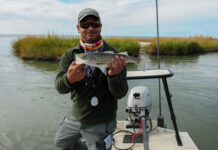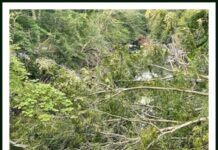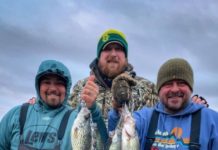My right arm ached as I trudged up the hill from the stream, having spent the past four hours fly fishing like a madman, in part because I just don’t get out on trout streams as often as I would like, and in part because I was having way too much fun. Along for the hike back to the truck were four nice keepers, each caught on the same elk-hair caddis that is my go-to fly on this and every other stream. The trout were joined on the hike by the memories they and the many more I missed hooking or lost while fighting gave me that morning. It was an epic day of fishing.
I was able to fish this fantastic stream, with just a little hiking to get there, because I owned it. You and I own it even now. The stream runs through public lands, managed for all of us by the U.S. Forest Service. It wasn’t just a day off from my work that allowed me to spend a morning fishing; it was having a place to fish.
My favorite fly-fishing spot, which is not a secret at all, is ready for you to enjoy it as well, because all of our tax dollars have ensured that such land is open for each of us — you, me, and every other citizen — to use responsibly. You don’t have to go far to find public lands; we have them in our backyards. City parks are often within walking distance; state parks, national recreation areas and monuments, national forests and even some national parks are all within driving distance. It’s all public, and it is all owned by each of us. You, me and every other citizen of this great country are public land owners.
Many of us take our public lands for granted in the U.S., but we shouldn’t. It’s a rare gift that our ancestors have given to us, and that is currently maintained and managed by the strength and reserve of our citizen-funded governments. Few other countries have such extensive public lands, and others often have limited access to those that they do have. In many countries, you can’t just park your truck and go for a hike, or toss your towel and cooler on a coastal beach. Those opportunities don’t exist everywhere, yet Americans can find public lands to explore and enjoy every day.
Some groups would like to change that. Industries and the organizations they support are more interested in exploiting public lands for natural resources — often non-renewable fossil fuels like natural gas and oil — than allowing public access. These industries have always had a place on our lands, and have literally fueled our country’s growth to its current status as one of the world’s top economies. Although the use of our federal lands is highly regulated, the price of that success was the addition of new roads and structures that fragment and degrade habitat, negatively affecting wildlife populations and the ability of Americans to enjoy them, as well as the climate-change-induced alterations to our planet of burning those fuels. Even with that price, these industries and some of the politicians that support them would like the outright sale of public lands to fossil fuel and resort development companies. Not lease, but sale. Gone forever.
Other organizations have said enough is enough. Many groups, like The Nature Conservancy, Sierra Club and the National Wildlife Federation have advocated for wildlife and against unsustainable extractive industries on our public lands. But the champion of protecting our public land rights is a relatively new organization, Backcountry Hunters and Anglers (BHA). Begun over a decade ago with a focus on the western U.S., they now have chapters and are engaged in public land issues in almost every state.
The fact that such an organization even exists tells you that the challenges that are currently facing our public lands are immense. Besides corporate takeover and misuse of public lands for private interests, BHA focuses on access, off-road vehicle misuse, pollution, and invasive species on public lands and waters. Members are not just hunters and anglers; they are hikers, bird-watchers, kayakers, cyclists, rock climbers and other outdoor enthusiasts from all walks of life and all political persuasions. We may not agree on lots of things, but BHA members all agree about keeping public lands in public hands.
BHA has promoted a variety of annual events to support public lands. Sept. 24 is National Public Lands Day, and BHA has been promoting September as Public Lands Month for years. To help celebrate Public Lands Month, the Murray State student chapters of BHA and The Wildlife Society will be showing a film that reveals the importance of our public lands as well as the biologists that are helping to conserve our wildlife. The film, called “Deer 139” is about three female scientists that follow a mule deer doe during her migration across public lands. The film will be shown outdoors at Murray State’s Hancock Biological Station at 7 p.m. Friday, Oct. 14, and is free and open to the public. Bring a folding chair and get ready for an epic adventure to help celebration our public lands and the wildlife that use them. I hope to see you there!
I’m a life member of BHA because I have realized that for most of us, memories like an achy arm and a creel full of fish only occur if you have public lands. A few of us have the means to enjoy these things on private land, but most of us cannot, and public land ownership is a central part of our American democracy. As has become very clear in recent years, we all need to work to keep our democratic values in place, and this is particularly true when we focus on public lands. To keep public lands in public hands will take people like you stepping up and making a difference, and joining BHA is a great first step. If you would like to learn more about BHA and their advocacy for public lands, you can find them at: www.backcountryhunters.org, and check out the Kentucky chapter at: www.backcountryhunters.org/kentucky.
Editor’s Note: Opinions expressed do not necessarily reflect the editorial opinion of the Murray Ledger & Times.































